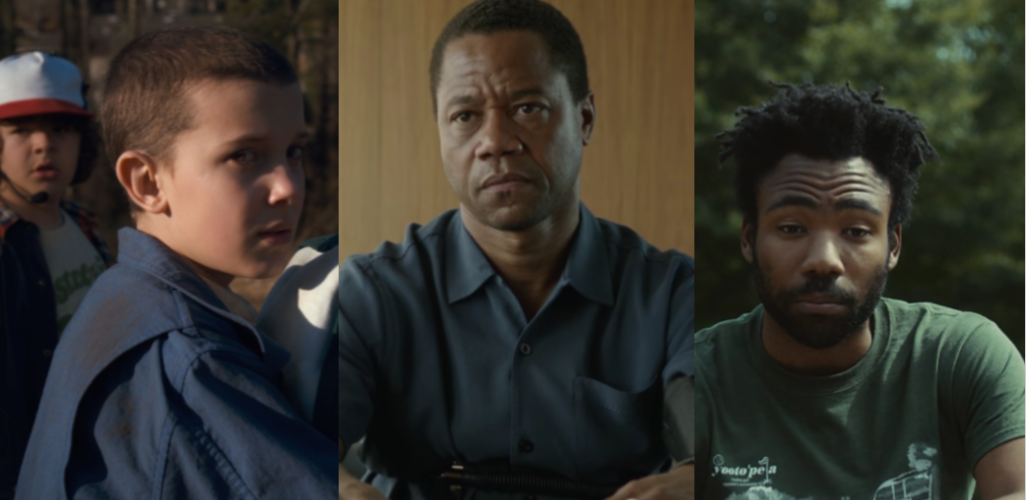If you haven’t heard of Stranger Things by now, you’ve probably spent a little too much time in the Upside Down. Basically what it comes down to is a small girl with a wicked buzz cut, deadly superpowers and a slightly unhealthy fascination with Eggos at the center of a 1980s-themed, science fiction-thriller television show. Oh, and Winona Ryder is a crazy lady obsessed with Christmas lights. That’s all you need to know.
P.S.: Barb deserved better.
— Taylor Stokes
The People v. O.J. Simpson: American Crime Story
I knew that The People v. O.J. Simpson: American Crime Story was more than I had ever imagined it would be about 35 minutes into its sixth and strongest episode, “Marcia, Marcia, Marcia.”
Lead O.J. prosecutor Marcia Clark, played masterfully by the great Sarah Paulson, is in the middle of arguably the most publicized case in American judicial history and the public scrutiny of her every move is crushing. So when she decides to get a haircut, the country loses its collective shit. It’s on newspaper covers and television programs. As she enters the courtroom, people whisper. Tears begin to form in her eyes. She sits down next to her Christopher Darden, her co-prosecutor on the case. He scribbles something on a piece of paper and slides it her way.
“It’s fantastic, I love it!,” the note reads.
I remember letting out a small gasp when that happened. It was such a nice, delicate moment. What I thought and hoped The People v. O.J. would be was scintillating historical fiction. It was. For weeks, it threw this country back into the O.J. case and all of its twists and turns. But it was also more than that. At its core, it had real, powerful emotion. This heart, in combination with its storytelling ability, puts it at the top of my list.
— Michael Errigo
Game of Thrones, Season six
Blood, guts and women at the helm: The sixth installation of HBO’s Game of Thrones culminated with the same shock-and-awe value that seems to characterize each of the past finales. But perhaps most noteworthy of the series’ overarching themes, the heightened role and increasing power dynamic of this season’s female leads signal a drastic and radical parallel from the months and years predating winter.
This season highlights the ability of its cast of female characters to utilize the classic Machiavellian means-justifying-ends mentality to their advantage, marking a robust metamorphosis from their former selves. This is seen in Daenerys’ rejection of her suitor and forward charge of Westeros by sea, Sansa Stark’s strategic takedown of Ramsay Bolton’s army and timely rescue of Jon Snow, Arya Stark’s expert and seemingly effortless murder of longtime enemy Walder Frey and Cersei Lannister’s decimation of King’s Landing and subsequent crowning as queen.
For a series so obsessed with female nudity and sexual objectification, this maturation of character and plot development serves as a fresh spin on television’s typical male-dominated archetype that so often skirts women to the side or makes them into damsels.
— Hallie Miller
After finding success portraying Troy Barnes on NBC’s Community, Donald Glover came into his own this year with FX’s Atlanta.
Glover served as the creator of the show and also played one of its main characters, Earn. Earn lives in Atlanta after dropping out of Princeton for a reason never explained on the show and tries to make money as the manager for Paper Boi, an up-and-coming Atlanta rapper who happens to be his cousin Alfred. Earn and Alfred are joined by Darius, their hilarious and rarely sober friend, and Van, the mother of Earn’s child.
Atlanta‘s success comes from finding a great balance between comedy and drama. Atlanta was able to provide great laughs throughout its first ten episodes through bits like a fake Arizona ad or the story of a “trans-racial” black man.
The show also touched on topics that rarely receive major attention on television. In the second episode alone, transphobia, mental health and police brutality were all part of the plot.
Atlanta was willing to take both a humorous and serious approach to topics not normally seen on television. For me, that makes it the best show of 2016.
— Jordan Katz



